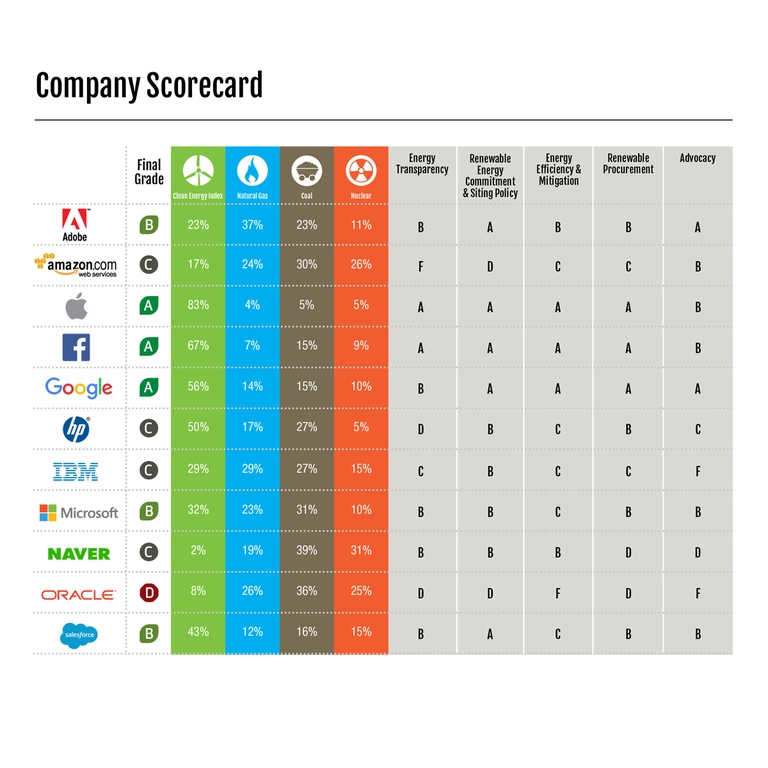
A group of experts in Tokyo suggested pouring radioactive water from Fukushima into the open sea. A marine biochemist explains the consequences of this absurd decision.
The internet and the IT industry combined account for 7 per cent of the world’s electricity, with a predicted increase to 12 per cent by the end of the year. Such increase is due to global internet traffic’s growth. These are some of the data included in the report named Clicking Clean: Who is Winning
The internet and the IT industry combined account for 7 per cent of the world’s electricity, with a predicted increase to 12 per cent by the end of the year. Such increase is due to global internet traffic’s growth. These are some of the data included in the report named Clicking Clean: Who is Winning the Race to Build a Green Internet? released by Greenpeace.
The research profiles all the parties involved in the online world, from service providers to streaming video platforms. What emerges is a fragmented scenario. On the one hand are internet giants like Apple, Google and Facebook, which have committed to or have already reached 100 per cent renewable energy for powering their data centres; on the other hand are platforms like Amazon and Netflix lagging behind. Not to mention Asiatic giants, such as Alibaba, Baidu, and Tencent, powering their servers with coal.
The footprint of one of the world’s most energy-consuming industries is rather clear and so are its future implications. If big companies switch to renewable energy to power their data centres, renewables demand will increase, while the use of fossil fuels will drop.
This is precisely what Apple, Google, and Facebook are doing already. In fact, the world’s biggest search engine will achieve 100 per cent renewable energy for its servers by the end of the year. In Greenpeace’s ranking, real-time chats like Skype and Whatsapp are positively positioned, as well as social networks like Instagram and Linkedin. Instead, Twitter and Amazon Web Services are performing poorly, with 10 per cent and 17 per cent of renewable energy respectively. “Amazon continues to talk a good game on renewables but is keeping its customers in the dark on its energy decisions. This is concerning, particularly as Amazon expands into markets served by dirty energy,” said Greenpeace USA Senior IT Analyst, Gary Cook.
As Greenpeace reports, “video streaming accounted for 63 per cent of global internet traffic in 2015, and is projected to reach about 80 per cent by 2020, according to Cisco Network Traffic Forecast, 2016” .
Among the biggest video streaming platforms is Netflix, which is registering a steady growth globally. The company “has one of the largest data footprints of the companies profiled, accounting for one third of internet traffic in North America and contributing significantly to the worldwide data demand from video streaming,” reads the report. “The company announced in 2015 that it intended to fully offset its carbon footprint, but a closer examination reveals it is likely turning to carbon offsets or unbundled renewable energy credits, which do little to increase renewable energy investment”.
“Like Apple, Facebook, and Google, Netflix is one of the biggest drivers of the online world and has a critical say in how it is powered. Netflix must embrace the responsibility to make sure its growth is powered by renewables, not fossil fuels and it must show its leadership here,” continued Cook.
Asian companies including Alibaba and Baidu are copies of Western ones, which are mainly banned in China. The use of renewables is drastically low (solar and wind power combined account for only 5 per cent of the total), while coal is increasing, accounting for 67 per cent. Samsung is not performing well, with a coal rate of 29 per cent.
For this, the environmental association urges the biggest IT companies to “develop a strategy for increasing their supply of renewable energy, through a mixture of procurement, investment, and corporate advocacy to both electricity suppliers and government decision-makers”.
Siamo anche su WhatsApp. Segui il canale ufficiale LifeGate per restare aggiornata, aggiornato sulle ultime notizie e sulle nostre attività.
![]()
Quest'opera è distribuita con Licenza Creative Commons Attribuzione - Non commerciale - Non opere derivate 4.0 Internazionale.
A group of experts in Tokyo suggested pouring radioactive water from Fukushima into the open sea. A marine biochemist explains the consequences of this absurd decision.
A federal court in Washington, D.C. has struck down the Dakota Access Pipeline, following years of campaigning by the Standing Rock Sioux tribe.
The Scottish island of Eigg is self-sufficient for its energy needs, relying almost entirely on renewable sources, especially thanks to a coordinated community effort.
President Magufuli in unmovable in going ahead with the Stiegler’s Gorge dam despite conservationists’ warnings of the damage it will cause the Selous Game Reserve’s ecosystem and wildlife.
A large dam along the Luangwa River in Zambia would have posed a serious risk to local people and wildlife, leading hundreds of thousands to oppose it. A call to which the government responded by halting plans to build it.
The first one megawatt solar power plant in the Chernobyl exclusion zone has become operational. This is the first step in a renewable energy development project promoted by the Ukrainian government in the area.
A tanker exploded at a gas and petrol station in Nigeria’s Nasarawa state on the 10th of September, killing 35 people and leaving some burned beyond recognition; 3 citizens had several spine and brain injuries, 2 of them are still on Intesive Care Units. Fela Habila , a local singer, is now stable and out of danger but
The largest tidal power plant in the world will be built in the Larantuka Straits. It will serve 100,000 people and help overcome some of the challenges of energy provision in Indonesia.
Robben Island’s solar energy micro-grid project will produce almost one million kilowatt hours of electricity annually, significantly reducing the cost and impact of buying diesel.









